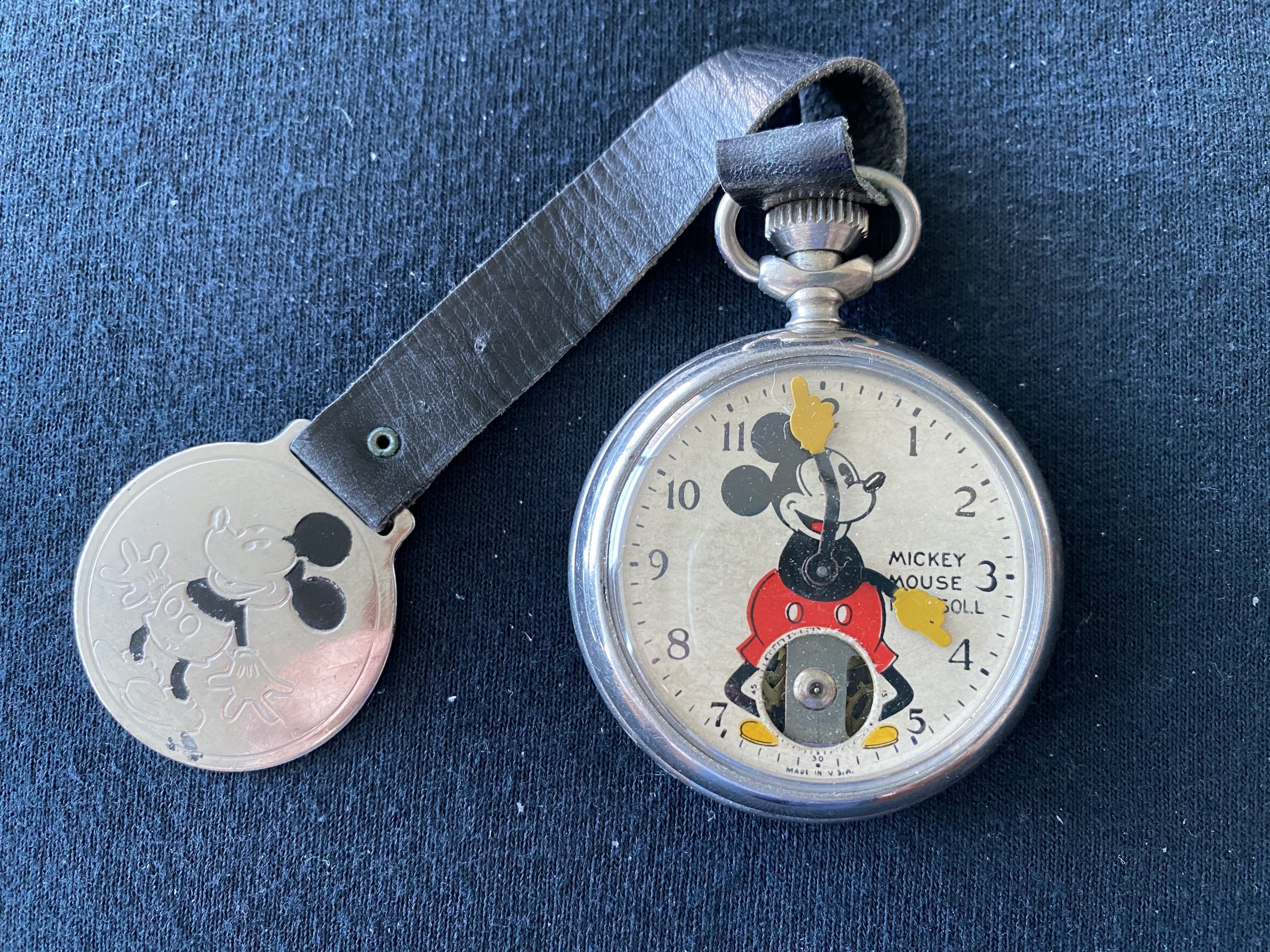
In Judaism, turning thirteen is a big deal. For generations, boys were called to read from the Torah in a ceremony called a bar mitzvah, which marked their entry as an adult into the Jewish community. This was a boys-only club until March 18, 1922, when American rabbi Mordecai Kaplan held the first bat mitzvah in the United States for his daughter Judith. Still, it was rare for a girl to have one. My mother didn’t. Even though both of my brothers celebrated this rite of passage, I did not.
My daughters and, more recently two of my granddaughters, celebrated b’not mitzvah (plural). I am sharing stories from three generations. My father’s written recollection of his bar mitzvah in 1934, and my reflections written when my younger daughter and granddaughters celebrated theirs.
THE WAY IT WAS
By my father, Sidney Levine, in honor of his first grandchild’s Bar Mitzvah, which was also the 50th anniversary of his own Bar Mitzvah
June, 1934… Year two of the New Deal. June 30th, the red-letter date. The week begins with the onset of an early summer heat wave. Temperatures hover near the triple digit mark. Blazing sun. Stifling humidity. Preparations are under way. Mother, tantes [aunts], neighbors, friends – all are engaged in an orgy of cooking and baking. Chickens are plucked and broiled. Fricasses, chopped liver, tsimmes, kishkas, kasha, lokshen, mandlen, challes, tayglech, mandel brot, and strudels — all are in various stages of completion. Large pots boiling on stoves, ovens are all ablaze. Every icebox and precious refrigerator in the neighborhood is stuffed with the overflow of this productivity.
Meanwhile, the focus of this sweaty, frenzied activity is absorbed in the daily heroics of the new “Samson,” Hammering Hank Greenberg, who has come as a messiah to lead the beloved Detroit Tigers out of the American League wilderness to their first pennant in a quarter century.
Saturday morning dawns with sun and heat unabated. The “man to be” is adorned in the new suit – 100% wool worsted, tan color, belted back jacket and knickers. The neighborhood shul is filled to capacity with 125 perspiring souls — women in the balcony, a collection of bearded elders wrapped in ankle length taleism surrounding the bimah. At the center stands Rabbi Moldowsky, awesome with a red beard and shining penetrating eyes in a stern visage — father of ten or twelve, advisor, interpreter, philosopher, and shochet [kosher slaughter].
Now, in a quick singsong, the blessings are chanted, followed by the Haftorah and the closing blessings. Then comes a five-minute break for “the speech” — obligatory thanks to mother and father and to the United Hebrew Schools for inspirational tutelage, promises to work diligently for the betterment of mankind and Judaism, and to remain steadfast in the study of Torah. Finally, the descent from before the Ark to a shower of candies from the balcony, and it’s over.
Sundown, and all the food comes forth from the secret hiding places and is lugged up to the Parkside Social Hall, a sparse room over the main business street store fronts. Tables and chairs have been set up. A small area has been cleared for the band and dance floor. The music is Morris Witcoff, violin virtuoso, and his Troubadors, specializing in freilichs, waltzes, Russian shers, polkas, and an occasional American fox trot. The endless dinner is punctuated by well wishes and greetings in appropriate order from relatives, friends, and officers and directors of the Landsmanschaft Society. A procession of gifts – the inevitable pen and pencil set, a siddur, a chumash, a tie clasp, envelopes with $2.00 and $3.OO in cash, a rare $5.00 bill, and a Mickey Mouse watch.
The “Bar Mitzvah” and a handful of boyfriends cavort in a corner. Batting averages and individual athletic heroics are loudly discussed. Trading card deals are arranged. Teachers and sundry elders are mocked and mimicked. Across the room are the girls, the older sister and a few daughters of relatives and friends. A constant chatter and giggle prevail. Never the twain shall meet. By 10:00, the “man of the day” and the older sister are dispatched to the babysitter who has been minding the younger brother and sister at the house about a block away. Their big day is ended. The adult revelers go on and on.
The only memento of all of this — the [Mickey Mouse] watch [featured image] — is now in Jonathan’s [my son, his grandson] proud possession.
###
ON THE OCCASION OF OUR YOUNGEST CHILD’S BAT MITZVAH
January 27, 1990: I wrote this for our youngest child’s Bat Mitzvah, ironically entitled “Rites of Passage.” At this point, our oldest was a freshman in college, and our middle child was “Sweet Sixteen.” I was feeling like this event marked a huge passage for our family as well as for our daughter:
Bat Mitzvah – rite of passage, coming of age
Yours… ours
How did this happen so quickly?
After the trips to the zoo, spilled milk, bedtime story marathons, birthday parties, skinned knee hugs… Are you really this grown up?
We remember countless rides to Detroit (Are we almost there?). Countless birthday parties and clan gatherings. Cousins by the dozens.
We remember Mickey, Minnie, Goofy, Donald… water slides, golf cart rides, child’s delight, Disney at night. The pool and the beach, the sing-a-longs, the friendly throngs of Sleepy Hollow.
We remember Israel – heat and crowds, relatives and ruins, splendor and sights… and almost losing you while buying a tallit for your older brother in the Old City.
We remember our humble tent amidst the waterfalls and glories of Yosemite… the breath-taking coast of California – clamoring down trails, running along beaches, awed by giant Redwood and Sequoia.
We remember paint box colored arches, magnificent canyons, a horseback ride through the majesty of Zion – and the decadence of a night at the Biltmore.
We remember lines, climbing steps, lines, monuments by night, lines, cherry blossoms, and lines in our nation’s capital.
We remember spelunking through New England’s caves, watching whales spout on the Cape, “circling the square” to leave Harvard Yard.
Sharing special times, sometimes with family and friends, always with each other – we have all come of age… together.
###
A Very Special B’not Mitzvah – February 23, 2019
I have been writing about how many religious communities have no place for people with disabilities since I started blogging in 2013. Having grandkids with special needs can do that to a grandmother. I have heard explanations from “we don’t do that” to “we have to create something separate to accomplish that.” But all along, the answer was very easy. Just open the door.
That happened for my family at the Jewish Reconstructionist Congregation (JRC) in Evanston, Illinois. When my twelve-year-old granddaughter started preparing for her Bat Mitzvah, her fifteen-year-old sister, who has a significant language disability and is anxious in front of crowds, requested to have one as well. She claimed she wanted to be on the stage and her little sister generously agreed to share her big day.
My daughter cautiously broached the topic with Rabbi Rachel Weiss. In the past, at other congregations, including her older child was a big deal. At JRC, it was simple. We brought her to services meant for everyone, regardless of differences. All were truly welcome. If she focused on her phone or sat when she was supposed to stand or drank water during the Yom Kippur fast, no one cared. Perhaps it was the feeling of belonging plus her love for all of the music in the service that made her comfortable. She started following the service in the prayer book, and then came her big ask. She wanted to have a Bat Mitzvah like her little sister.
Turns out, if one is flexible and accommodating, technically all she had to do was to be called to the bimah to recite the blessings before and after the Torah reading. She practiced those blessings but we had no idea if she would recite them in front of a congregation. To our amazement, she did, but she did much more. Rabbi Weiss and Cantor Howard Friedland respectfully asked her if she wanted to carry a Torah. She did. She danced with joy as she proudly carried hers next to her sister. Each time there was an opportunity to participate, they asked if she wanted to try it. Would she let her grandfather wrap her in a tallit (prayer shawl)? She did. Did she want to come up so her parents could tell her how proud they were of her. She did. Would she like to join her little sister on the bimah to receive the priestly benediction? Yes, please.
After so many years of trying to find ways to include my granddaughter in religious life, in the end the answer was simple. Just open the door, invite her in, and ask how can we help you be part of our caring community.
I invite you to read my book Terribly Strange and Wonderfully Real and join my Facebook community.
Boomer. Educator. Advocate. Eclectic topics: grandkids, special needs, values, aging, loss, & whatever. Author: Terribly Strange and Wonderfully Real.


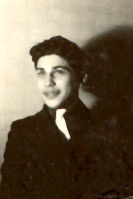
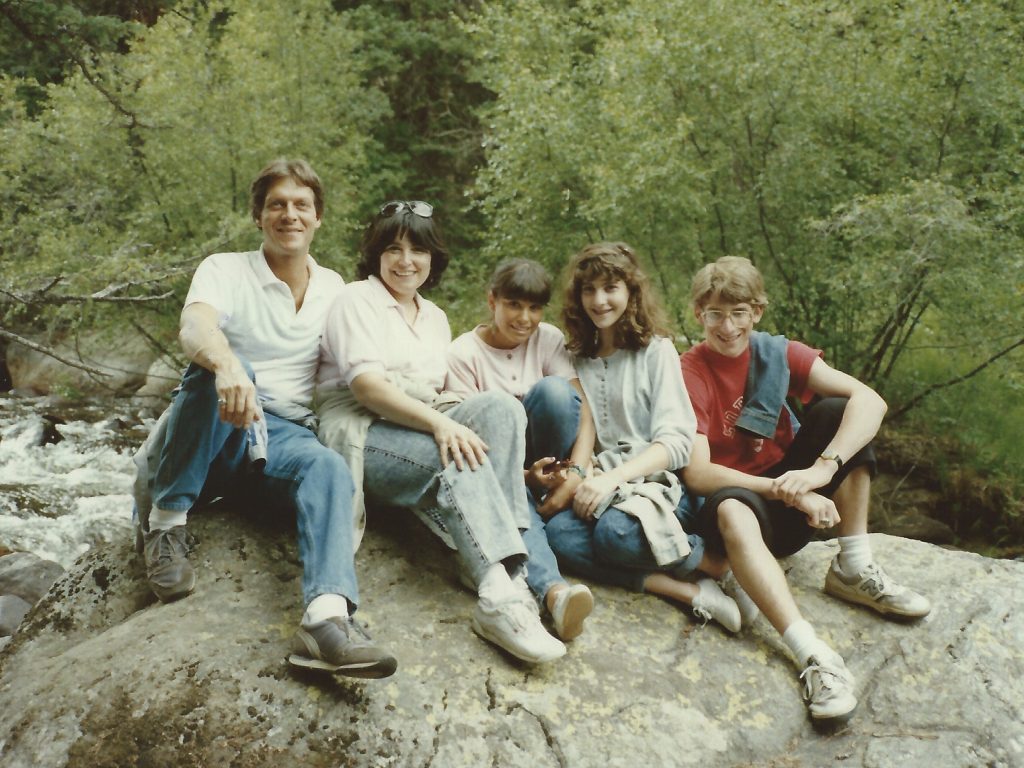
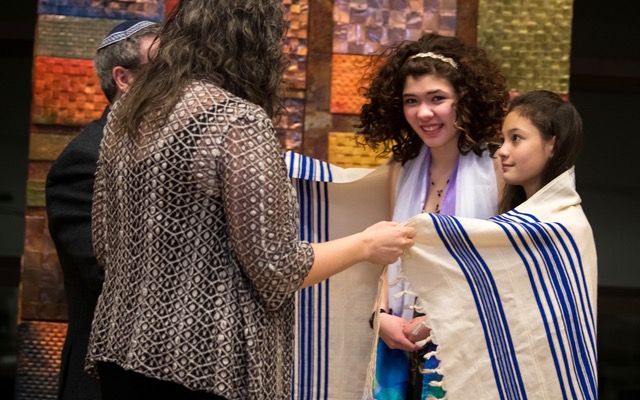
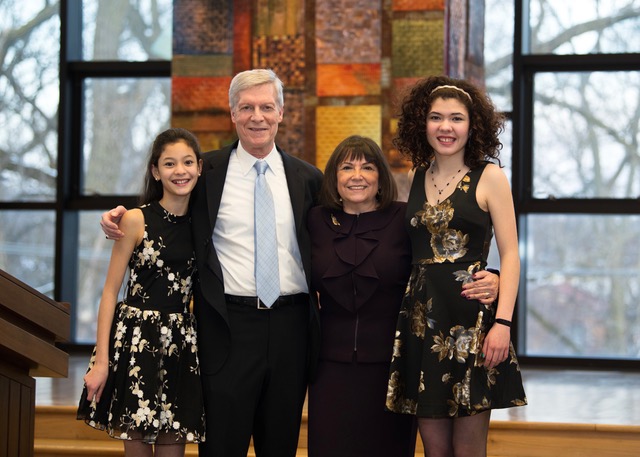

What a beautiful recitation of Bar and B’Not Mitzvah through the years with your family. And the last one with your two granddaughters was an absolute joy. As you say, just open the door. And thank you for sharing these with us.
Thanks, John. Perhaps because I am older and more sentimental, I was so emotionally moved by my granddaughters’ rite of passage. My children’s were personal services and thus very meaningful. My father’s was interesting to me as a window into that time period. Sadly, we skipped a generation — mine.
While rituals are part of the beauty of many religions, unfortunately they’re often cloaked in arcane and outdated thought and practices. Thankfully many are adapting to reality. That you’ve interspersed your story with the personal details surrounding each rite of passage makes them even more beautiful, but that JRC embraced your granddaughter’s uniqueness and allowed her to express it is the most beautiful part of all. Paraphrasing your closing sentence might well be etched in stone: “We open our door, invite you in, and ask how we can help you become part of our caring community.” Such a heartfelt and beautiful story, Laurie, thank you!
Thanks for understanding what I was trying to say by contrasting these ceremonies over generations. I’m proud that JRC is striving to be inclusive in every way.
Oh Laurie, this is so beautiful! I love all three parts of it equally. Your father’s description of a 1934 bar mitzvah was fascinating to me. The memories that you offered up at your daughter’s bat mitzvah were a sweet summary of your family coming of age as a family, written almost as a poem. And your discussion of your granddaughters’ b’not mitzvah was very powerful and important. Just open the door, indeed. Thank you for sharing all of it.
Thanks, Suzy. My father wrote something for all of my kids’ services. In those days, we published our own books for the service. It was a huge ask for parents and became somewhat competitive. Also, it put most of the focus on the child, so they stopped it at some point after we had left the congregation. We returned a few years ago when they hired a rabbi who was a friend of my daughters growing up. She shifted the focus to community, which I really like. Still, I’m glad I have my father’s written memories.
As a Reconstructionist for more than 20 years, I’m so gratified that this movement is walking its talk about inclusion (although I’m not surprised), and that the day meant so much to your granddaughters and to you. My own congregation also has welcomed young people with special needs. Like you, Laurie, I didn’t have a bat mitzvah, but I did go to Hebrew school. There was a ceremony for girls, but it wasn’t fully equal and I wouldn’t go for it. Finally, your father’s story made me smiled and laugh, with his great descriptions bringing back memories of an older time, food and all!
Marian, I think we had similar Jewish “educational” experiences. One year of Hebrew, which I promptly forgot, and endless years of Sunday School. My parents forced me to stick it out until I was “confirmed” at age 16. We recited a meaningless and boring “cantata” (mostly readings with little music). We had a small celebration at home. Nothing like the blowouts my younger brothers had for their bar mitzvahs.
Wonderful story Laurie. As I’ve told you, my nephew Michael, now in his late 20s, is severely autistic. When he was younger his parents found a wonderful special needs Hebrew school program for him in Maryland where they lived.
Where there’s a will, there’s a way!
I so agree, Dana. When we went shopping for a congregation that would welcome our whole family, several places made excuses for something that is actually not that hard to do.
Such a beautiful story, Laurie. The juxtaposition of the three different ways to tell the stories, and the stories themselves are rich, indeed and so meaningful. Coming from Detroit, as I do, I wondered if I might know someone from your father’s generation, but I didn’t, though it was so well-told that it felt like a screenplay. As Suzy comments, your own thoughts to your daughter are poetic and lovely. And your finale is so moving, and yes, of course, I related enormously to my own tale of getting my own special needs child ready for his own bar mitzvah. It is marvelous that your congregation has become so inclusive and welcoming. I thought of that in the language of the service I just participated in an hour ago as we begin the holiest day of our year. Here’s hoping we all have a good new year.
Thanks, Betsy. In so many ways, we re making progress toward inclusion and meaningful rites of passage, like bar/bat mitzvahs. In other tragic ways, our country is sliding backwards. I want to feel hopeful that this new year will bring the change we crave so our country can be a more inclusive, accepting, and empathic one. It starts with defeating Trump, but how to bridge the gap between us and his base? That worries me.